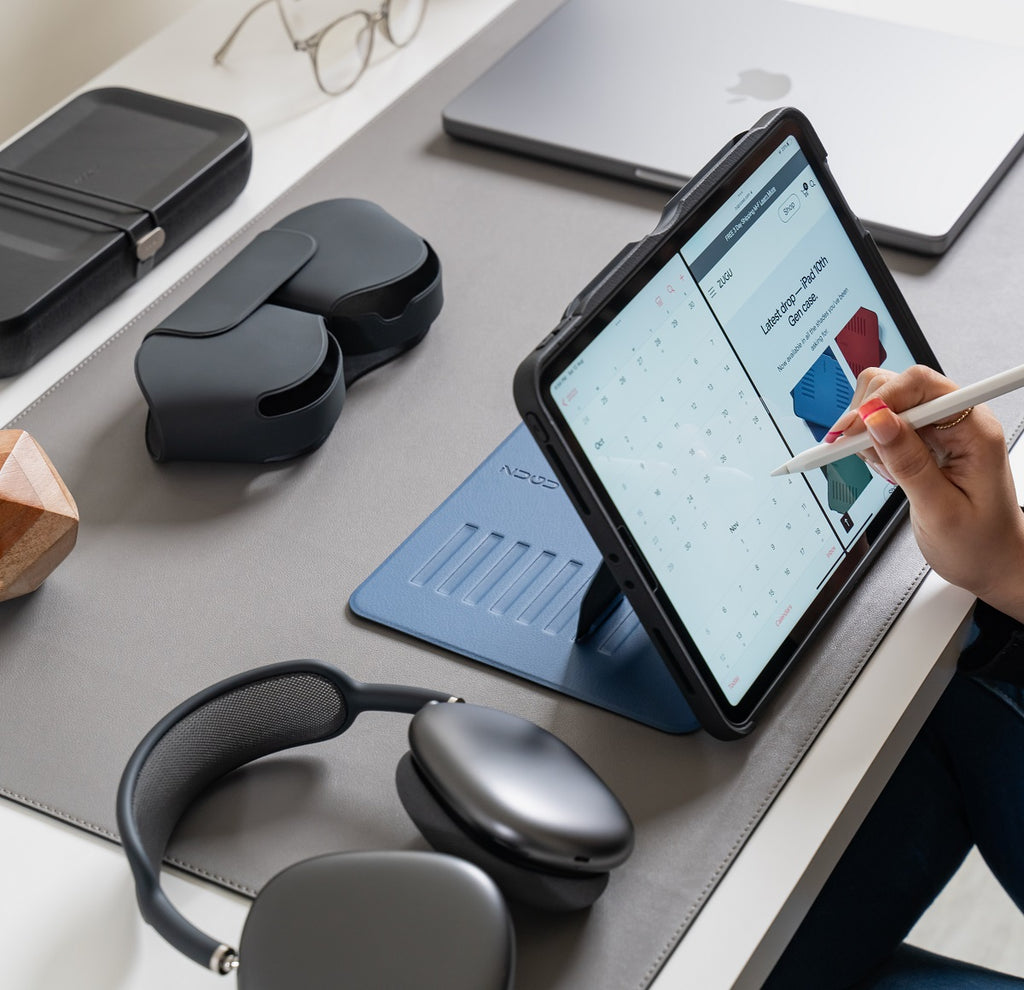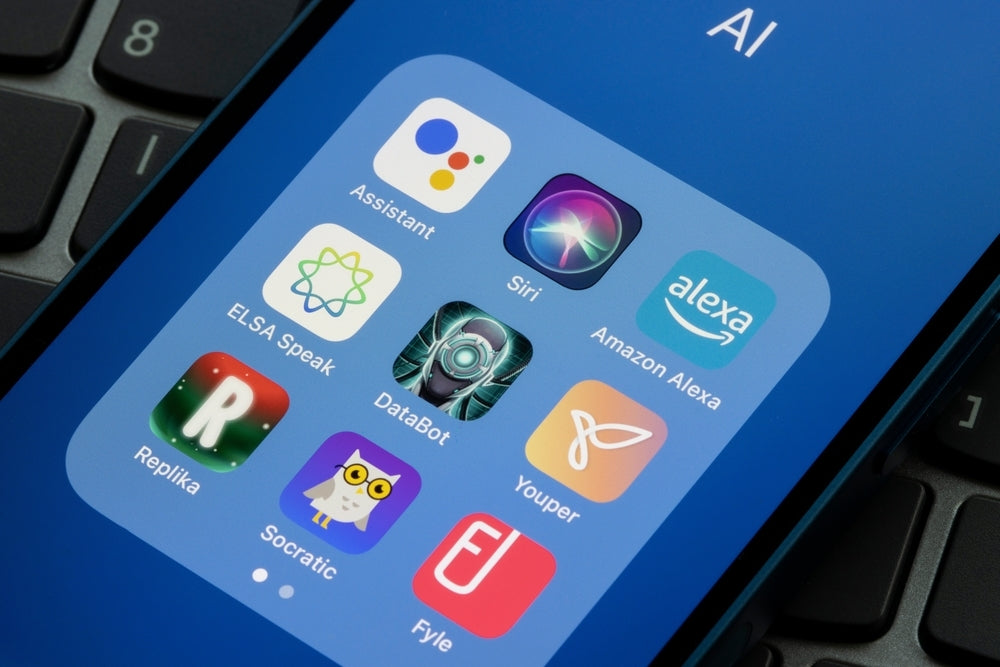iPads and AI: What the Future Holds for iPadOS
In the ever-shifting, ever-morphing terrain of tech wizardry, Apple's iPad stands tall as a beacon of innovation. It's like the Swiss Army knife of gadgets, ready to tackle anything from productivity to binge-watching your favorite shows. And powering this digital Swiss Army knife is none other than iPadOS — the software genius behind the scenes, constantly getting a tune-up from the magicians at Apple.
But hey, even the mighty iPad isn't without its quirks and surprises. From Siri's sassy responses to the occasional autocorrect mishap, there's never a dull moment in the world of iPadOS.
The Evolution of iPadOS
Since its inception, iPadOS has undergone more makeovers than a chameleon at a rainbow convention. It's transformed from a humble mobile operating system into a digital powerhouse, capable of juggling more tasks than a circus performer on caffeine. With each iteration, Apple has listened to user feedback. With every suggestion, complaint, and emoji-filled rant, users shape the destiny of iPadOS, turning it from a clunky caterpillar into a sleek butterfly of productivity.
The Importance of iPad Cases in Enhancing User Experience
While the iPad itself offers a myriad of features and functionalities, accessories play a crucial role in enhancing its usability and protection. Among these accessories, iPad cases stand out as essential companions. Sure, the iPad can do a lot on its own, but let's face it — without a case, it's like Batman without his utility belt. Sure, he's still a badass, but he's a lot more vulnerable to being thrown off the top of a building.
The Intersection of iPads and AI
Picture this: you're chilling with your iPad, trying to conquer your never-ending to-do list, when suddenly, it hits you — what if your iPad could read your mind and finish your tasks for you?
Well, maybe not quite that, but you get the idea. With the rise of artificial intelligence (AI), our devices are getting smarter than ever, and it's like having a personal assistant baked right into your iPad.
AI-powered features have the potential to revolutionize how we interact with our devices, making them more intuitive, adaptive, and personalized. In the context of iPadOS, the incorporation of AI holds immense promise for enhancing productivity, streamlining workflows, and unlocking new possibilities for creativity.
The Current Landscape of iPadOS
Key Features and Functionalities of the Latest iPadOS Version
Apple's commitment to innovation is evident in the latest version of iPadOS, which introduces a range of new features and enhancements designed to elevate the user experience. From enhanced multitasking capabilities to powerful productivity tools, iPadOS 17 offers a comprehensive suite of functionalities tailored to meet the needs of modern users. Key features include:
- Lock screen customization: Personalize your Lock Screen with new wallpaper options, interactive widgets, and customizable fonts to keep you informed and entertained at a glance.
- Interactive widgets: Widgets on the Home Screen and Lock Screen are now more interactive, allowing you to complete tasks like checking off to-do items or controlling smart home devices with just a tap.
- Messages enhancements: Share your location or request a friend's location right in Messages, and enjoy transcribed audio messages for easier communication.
- Stickers: Spice up your conversations and photos with stickers, which can be added anywhere you use the onscreen keyboard or Markup tools.
- FaceTime Improvements: Leave audio or video messages if someone doesn't answer your FaceTime call, and add fun reactions like hearts and confetti during calls.
- Health app on iPad: Access the Health app optimized for the iPad's larger screen, with features like health trends, medication reminders, menstrual cycle tracking, and mental health resources.
- Screen distance feature: Help protect your vision with Screen Distance in Screen Time, encouraging you to maintain a healthy viewing distance from your iPad.
- Visual Look Up: Identify objects in photos and videos with Visual Look Up, which can even suggest related recipes for food items.
- Safari enhancements: Use multiple profiles for different browsing needs, autofill verifications from Mail, and share passwords with trusted contacts.
- Privacy and security: Communication Safety now includes protections against sensitive content, and enhancements to Lockdown Mode help protect against cyberattacks.
- Freeform drawing: Collaborate with new drawing tools like watercolor brushes and calligraphy pens in the Freeform app.
- Accessibility improvements: Personal Voice helps people with speech loss create a voice that sounds like them, and Point and Speak makes it easier for those with low vision to interact with text labels.
- Apple News+ and podcasts: Enjoy daily crossword puzzles in Apple News+ and access Apple News+ audio stories in the Podcasts app.
- Notes and reminders: Easily review PDFs and scans in Notes, and use Grocery Lists in Reminders to streamline your shopping experience.
- Home app enhancements: Activity History in the Home app lets you track who locks or unlocks doors and see recent activity for security devices.
- AirPlay in hotels: With iPadOS 17.3, you can use AirPlay in select hotels to stream content directly to your room's television.
- Tips app: Learn tips and tricks for making the most of iPadOS 17 with the updated Tips app.
iPadOS 17 is compatible with these devices:
- iPad Pro 12.9-inch (2nd generation and later)
- iPad Pro 10.5-inch
- iPad Pro 11-inch (1st generation and later)
- iPad Air (3rd generation and later)
- iPad (6th generation and later)
- iPad mini (5th generation and later)
User Satisfaction and Feedback
Feedback from users and critics alike has been overwhelmingly positive, highlighting the intuitive interface, powerful performance, and seamless integration with other Apple devices and services. Users appreciate the fluidity of the user experience, the versatility of the iPad, and the wealth of productivity tools at their disposal.
Limitations and Areas for Improvement
Despite its many strengths, iPadOS is not without its limitations. Some users have expressed frustration with certain aspects of the operating system, such as the limitations of multitasking, the absence of pro-level features in certain apps, and the need for further optimization for specific workflows. Additionally, there is room for improvement in areas such as file management, system stability, and app compatibility.
As Apple continues to iterate and refine iPadOS, addressing these limitations and incorporating user feedback will be crucial to maintaining the platform's position as a leading choice for professionals, creatives, and everyday users alike.
Integration of AI in iPadOS

AI Capabilities and Its Potential Impact on iPad Functionality
Artificial Intelligence represents a paradigm shift in computing, enabling machines to learn from data, adapt to new information, and perform tasks that traditionally require human intelligence. In the context of iPadOS, the integration of AI opens up a world of possibilities for enhancing functionality, personalization, and user engagement.
Current AI Applications within iPadOS
iPadOS already incorporates AI-driven features that enhance user experience and productivity. These include:
- Siri integration: Siri, Apple's virtual assistant, leverages AI algorithms to understand natural language queries, perform tasks, and provide personalized recommendations.
- Machine learning in photos: The Photos app uses machine learning algorithms to intelligently organize and categorize images, making it easier for users to find and relive their favorite moments.
- Predictive text and typing: The QuickType keyboard leverages AI to offer predictive text suggestions, autocorrection, and contextual predictions, improving typing speed and accuracy. No more ducks will be given.
Exploring the Possibilities of AI-Driven Features in Future Updates
Rumors are swirling about the potential features of iPadOS 18, and all eyes seem to be on the integration of AI. Taking cues from iOS 18 and the technological trends of the past year, AI appears to be a focal point for Apple's developments in 2024. While specific details about iPadOS 18 remain scarce, AI remains a common theme, signaling Apple's recognition of the rising popularity of Large Language Models and chatbots, surpassing even Siri's capabilities.
According to reports, Apple is diligently working on an AI upgrade dubbed Ajax GPT, which is rumored to surpass existing models like ChatGPT. Bloomberg's Mark Gurman also suggests that 2024 will witness significant strides in Apple's AI endeavors.
As for the specific features of iPadOS 18, the picture remains murky. Will Siri merely enhance its ability to answer queries and engage with users, or are we poised for a monumental leap in its capabilities? The answers to these questions may only surface during the eagerly anticipated WWDC event in June.
Looking ahead, the potential for AI-driven features in future updates of iPadOS is vast. Some areas ripe for exploration include:
- Enhanced productivity tools: AI-powered assistants could help streamline workflows, automate repetitive tasks, and provide intelligent suggestions to boost productivity.
- Personalized content recommendations: By analyzing user behavior and preferences, iPadOS could deliver customized content recommendations tailored to individual interests, whether it's news articles, apps, or entertainment.
- Improved accessibility: AI algorithms could enhance accessibility features, such as voice control, gesture recognition, and real-time language translation, making the iPad more accessible to users with diverse needs.
Related Reading: Looking Back - What Happened at WWDC
Potential Innovations and Advancements Driven by AI Integration
The integration of AI into iPadOS will unlock a multitude of innovations and advancements, revolutionizing how users interact with their devices and unleashing new possibilities for creativity and productivity. Some potential innovations driven by AI integration include:
- Contextual awareness: AI algorithms will enable iPadOS to understand context and anticipate user needs, providing relevant information and suggestions at the right time and in the right context.
- Natural language understanding: Advanced natural language processing capabilities will enable more conversational interactions with Siri and other AI assistants, making voice-based commands and queries more intuitive and effective.
- Personalized user experience: AI-driven personalization will allow iPadOS to adapt to individual user preferences and habits, delivering tailored recommendations, content, and experiences to enhance user satisfaction and engagement.
- Predictive analytics: AI-powered predictive analytics will enable iPadOS to anticipate future events and trends based on historical data and user behavior, empowering users to make informed decisions and take proactive actions.
Predicted Impact on User Experience and Productivity
Integrating AI into iPadOS will profoundly impact user experience and productivity, offering users a more intuitive, efficient, and personalized computing experience. With AI-powered features, your iPad will become more than just a tool — it'll be your trusty companion, your digital co-pilot, and maybe even your therapist (hey, we all need someone to talk to sometimes). Say goodbye to mundane tasks and hello to a future where your iPad anticipates your every need, like a psychic fortune teller with a penchant for productivity.
As Apple continues to innovate and push the boundaries of what is possible with iPadOS, users can look forward to a future filled with exciting new features, capabilities, and experiences that will redefine how they work, create, and connect with the world around them.
Challenges and Considerations

Potential Challenges in Integrating AI with iPadOS
While the integration of AI into iPadOS holds immense promise, it also presents certain challenges and considerations that need to be addressed:
- Privacy concerns: The collection and analysis of user data to power AI algorithms raise concerns about privacy and data security. Apple must prioritize user privacy by implementing robust data protection measures and providing transparent control over how user data is collected and used.
- Ethical implications: The use of AI in iPadOS raises ethical considerations regarding the responsible development and deployment of AI-powered features. Apple must ensure that AI algorithms adhere to ethical principles and values like fairness, transparency, and accountability.
- User acceptance and adoption: The success of AI-powered features in iPadOS depends on user acceptance and adoption. Apple must educate users about the benefits of AI and address any concerns or misconceptions to foster trust and confidence in AI-powered technologies.
Privacy and Security Concerns Associated with AI-Powered Features
As AI becomes increasingly integrated into iPadOS, there are inherent privacy and security concerns that need to be addressed:
- Data privacy: AI-powered features may rely on the collection and analysis of sensitive user data, raising concerns about data privacy and confidentiality. Apple must implement stringent privacy controls and safeguards to protect user data from unauthorized access or misuse.
- Security vulnerabilities: AI algorithms may be vulnerable to exploitation or manipulation by malicious actors, leading to security or data breaches. Apple must prioritize security by regularly updating and patching vulnerabilities in AI-powered features to mitigate the risk of exploitation.
- Transparency and accountability: Apple must ensure transparency and accountability in the development and deployment of AI-powered features, providing users with clear information about how their data is used and ensuring that AI algorithms operate in a fair and unbiased manner. With the spread of misinformation, it is imperative that AI understands fact from fiction, despite how popularly believed fake news might be.
User Adaptation and Education Regarding New AI Functionalities
The successful integration of AI into iPadOS depends on user adaptation and education:
- User training and support: Apple must provide user training and support to help users understand how to effectively utilize AI-powered features in iPadOS. This may include tutorials, user guides, and online resources to help users get the most out of their devices.
- Feedback and iteration: Apple should solicit feedback from users regarding their experiences with AI-powered features and use this feedback to iterate and improve the functionality and usability of these features over time.
- Accessibility considerations: Apple must ensure that AI-powered features are accessible to users with diverse needs and abilities, taking into account factors such as language, literacy, and cognitive skills to ensure that all users can benefit from the capabilities of AI in iPadOS.
AI Can't Save You from Drops and Scratches

Sure, AI might be able to predict your next move or suggest the perfect playlist, but when it comes to preventing your iPad from taking a tumble off the kitchen counter or getting scratched by your keys in your bag, there's only one solution — a trusty iPad case.
When it comes to safeguarding your precious iPad from the perils of everyday life, one name stands out above the rest — ZUGU (that’s our name, yay!). Renowned for its unparalleled durability, innovative design, and superior protection, a ZUGU case is the ultimate choice for keeping your iPad secure and sound.
With features like military-grade drop protection, reinforced corners, and a rugged yet sleek exterior, ZUGU cases are built to withstand even the most adventurous of lifestyles. Whether you're commuting to work, traveling the globe, or simply lounging at home, you can trust ZUGU to keep your iPad safe from drops, scratches, and bumps along the way.
But it's not just about protection — we design our cases with user convenience in mind. From adjustable viewing angles to secure magnetic closures, every aspect of a ZUGU case is crafted for you, ensuring maximum functionality and ease of use.
Make A Non-Artificially Intelligent Choice
The future of iPadOS holds immense promise with the integration of artificial intelligence and the indispensable role of accessories like the ZUGU iPad Pro case. While AI enhances productivity, creativity, and personalization, your case ensures that your iPad stays protected from the bumps and scratches of everyday life. As we eagerly anticipate the exciting advancements in iPad technology, keeping your iPad safe and secure will be more critical than ever.
With AI integration in iPadOS and the durability of ZUGU, your iPad will be unstoppable. Don't miss out — shop now and safeguard your iPad with ZUGU!
Table of Contents
Related Articles
Here’s Everything You Need to Know about the 2025 iPad Pro M5
Rumors about new Apple devices always spread fast — but this time, the hype was absolutely worth it. Apple has officially unveiled the 2025 iPad Pro, powered by the groundbreaking M5 chip, and it’s setting a new bar for performance, AI capability, and design. The iPad Pro has long been...
Read More...Here’s Everything You Need to Know about the 2025 iPad Pro M5Is Your iPad Case Eco-Friendly? What to Know About Materials and Longevity
Your iPad is your work companion, entertainment hub, and digital canvas all rolled into one. But while you're protecting your precious device, have you ever wondered what your case is doing to protect the planet? If you're like most iPad users, the answer is probably "not really,” and that's perfectly...
Read More...Is Your iPad Case Eco-Friendly? What to Know About Materials and LongevityBuying an iPad Pro 2022 in 2025: Is It Worth It?
If you're in the market for a premium iPad but want to save a little cash, you might wonder if the iPad Pro M2 is still a smart buy in 2025. The M2 model, released in late 2022, was hailed as one of the most powerful tablets of its time,...
Read More...Buying an iPad Pro 2022 in 2025: Is It Worth It?


